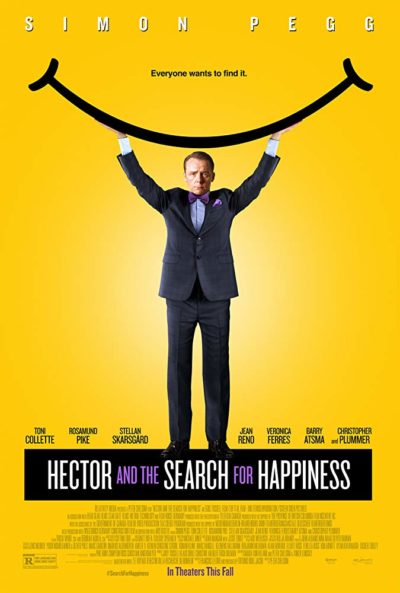
With his starring roles in the excellent Cornetto trilogy, his ongoing parts in large franchises (Star Trek, Mission Impossible, and Ice Age) and sporadic other successes – I enjoyed both Paul and Run Fat Boy Run – Simon Pegg seems to have a successful film career without yet heading up a major worldwide box office hit. As engaging as he is, as always, in Hector and the Search for Happiness, it seems that he is still looking for that elusive break out movie.
Here he plays the titular Hector who, despite having a successful psychiatric practice, a swanky London apartment and an attractive, supportive, girlfriend (Clara – Rosamund Pike), is feeling that he is not truly happy. To find happiness for his own benefit, and to enable him to help his patients more, he embarks on an unplanned trip around the world. The opening scenes setting this up are quite well done, but it is when the trip starts that the problems with the film begin to emerge.
The basis for the story is a self help book, and unfortunately, the trite clichéd solutions you would expect to find in the source material soon become evident in the story. A visit to China to meet some monks who are worldly wise, despite their remoteness, is followed by a stay in Africa where the locals consist entirely of either singing and dancing villagers or evil warlords. That his trek ends in Los Angeles feels both appropriate and utterly predictable.
The episodic nature of the film is exacerbated by the cameo appearances of stars such as Jean Reno and Toni Collette in the various locations. Stellan Skarsgård, as a businessman Hector meets on his way to China looks as if he’s rather be anywhere else for all of his scenes, and Christopher Plummer’s character, a professor who is studying happiness and who Hector befriends in LA, is both vacuous and annoying.
The film is not a complete disaster, aside from Pegg’s likeability, the handful of gags scattered through the plot are pretty funny. I also found the Tintin homages quite interesting. Hector has a copy of Blue Lotus so the boy reporter is mentioned near the beginning. Once on his journey, there are clear references to Tintin’s adventures, most obviously in Tibet, but also in the Congo and America, and some of the shot framing seems to come straight out of the pages of the books. That is most notable with Hector’s staring out of the window on his flight into Africa.
Otherwise, the film at two hours long, is a bit of a hard slog.
Rating 5 out of 10